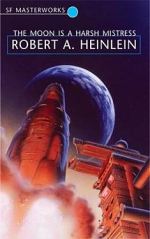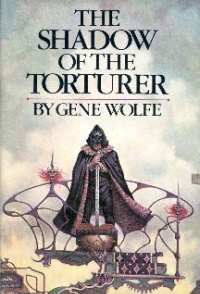 I’ve always believed that many Science Fiction fans view the “Golden Age” of the forties, fifties and sixties through rose-tinted spectables. Writers like Isaac Asimov and Robert Heinlein opened up worlds of wonders in which bold explorers established galactic empires in which doors dilated, and when you’re about 14 you don’t really notice the stilted prose, cardboard characterisation and sometimes very dodgy politics.
I’ve always believed that many Science Fiction fans view the “Golden Age” of the forties, fifties and sixties through rose-tinted spectables. Writers like Isaac Asimov and Robert Heinlein opened up worlds of wonders in which bold explorers established galactic empires in which doors dilated, and when you’re about 14 you don’t really notice the stilted prose, cardboard characterisation and sometimes very dodgy politics.
Later generations of SF authors, from the 60s “New Wave” onwards were not only better writers, but had a rather more sophisticated view of history, culture and politics, and therefore haven’t dated anything like as badly.
Ian Sales clearly feels the same way, with his evisceration of Robert Heinlein’s The Moon is Harsh Mistress, still revered by many as a classic of it’s genre.
I can see no good reason why it is so well-regarded. In fact, I suspect its reputation is symptomatic of everything that is wrong with the genre and fandom.
And I can’t find myself disagreeing with that. Quite frankly, Heinlein fanboys can often be the sort of people who frequently give SF fandom a bad name.
Sales starts by taking aim at Heinlein’s crude sexism masquerading at enlightenment.
The “beautiful†bit is important, because every male that meets her has to look her up and down and whistle appreciatively. This is common practice when meeting an attractive female on the Moon. All women exist to be ogled by men, but it’s okay because they like it and they’re really in control. We know this from, well, from every book Heinlein has written, pretty much.
And then there’s a “Society without laws” which reads like a wet dream of the most detached-from-reality section of the American gun lobby.
The whole idea of a society succeeding because its members are free to kill each other without consequence – other than becoming a target for another murdering citizen – is just so stupidly dumb, I’m amazed Heinlein ever thought it workable. No, it wouldn’t lead to polite people, it would lead to dead people. And the survivors would be those more willing to kill than anyone else. This is not a village in some foreign land, either. It is on the Moon, where people cannot survive without technological assistance. So what happens if you kill the person who runs the air-plant? Everyone dies.
No, I haven’t read the book, though I’ve read other works of his, which have similarly reeked of sexism, casual sociopathy, preachiness and social & political structures that only work because the author stacks the deck. This book in particular has by reputation become one of the ur-texts for the persistent frontier-libertarian “Wild West in Spaaaace” trope of SF which Charlie Stross has very effectively demolished.
Commenter Martin McGrath makes a good point that Heinlein’s influence spreads beyond fandom.
In fact I think there’s a case to be made for the idea that Heinlein’s books is more important to the American right wing libertarian (Tea Party) movement than Ayn Rand because, while they pay lip service to Atlas Shrugged, it’s pretty clear that most of them have mostly read Heinlein and they’ve adopted the gung-ho militarism and nationalism that are absent in Rand’s work.
So, while it’s a bad book, it is an important book and one that should be dissected for its stupidities as often as possible – as you have done.
I suppose we ought to give Heinlein credit for one thing. His writing, and that of other rightwing SF authors who followed in his wake gave Britain’s Iain Banks something to react against. Without Heinlein, would be have had The Culture?

 Got to love this.
Got to love this. 
 Today’s eye-rolling dispatch from the trenches of the ongoing SF culture wars comes from an opinion piece by someone called Paul Cook writing for Amazing Stories entitled
Today’s eye-rolling dispatch from the trenches of the ongoing SF culture wars comes from an opinion piece by someone called Paul Cook writing for Amazing Stories entitled